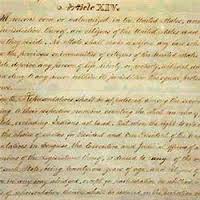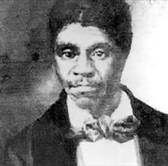 While the 13th Amendment abolished slavery, it did nothing regarding the legal status of the former slaves. The 14th Amendment gave them citizenship and did much more.
While the 13th Amendment abolished slavery, it did nothing regarding the legal status of the former slaves. The 14th Amendment gave them citizenship and did much more.
At the end of the American Civil War Congress passed the Civil Rights Act of 1866 granting US citizenship to former slaves. The constitutional authority off Congress to pass such a law was unclear, and a future Congress could by statute, potential deny citizenship status to former slaves. The only way to be certain of congressional authority on this subject and assure permanent citizenship was to amend the Constitution.
Another area of questionable congressional authority was the ability to address the Black Codes enacted by many Southern States that diminished the benefits of citizenship for former slaves. The status of former slaves was not the only issue facing the country after the war. There were also questions of congressional representation, former rebels, and debts incurred by the rebellion.
To address these concerns Congress proposed the Fourteenth Amendment and sent it to the States for ratification on June 13, 1866. With the ratification of the twenty-eighth State, South Carolina, on July 20, 1868, then Secretary of State William Seward declared it to be part of the US Constitution.[1]
The Fourteenth Amendment’s Section 1
The Fourteenth Amendment redefined the relationship between the federal government and the States. The phrase: “No state shall make or enforce any law…” and the final section: “The Congress shall have power to enforce, by appropriate legislation, the provisions of this article.” provided Congress the power to enact laws directly affecting state policies regarding constitutional rights and guarantees. The Fourteenth Amendment implicitly granted power to federal courts to review state laws for compliance with constitutional rights.
The Fourteenth Amendment’s first section consists of four clauses:
- The Citizenship Clause
- The Privileges and Immunities Clause
- The Due Process Clause
- The Equal Protection Clause
The Fourteenth Amendment, Section 1 reads as follows:
Section 1. All persons born or naturalized in the United States, and subject to the jurisdiction thereof, are citizens of the United States and of the State wherein they reside. No State shall make or enforce any law which shall abridge the privileges or immunities of citizens of the United States; nor shall any State deprive any person of life, liberty, or property, without due process of law; nor deny to any person within its jurisdiction the equal protection of the laws.
The Citizenship Clause
 Prior to the Fourteenth Amendment, the Constitution did not define a US citizen. Section 1 settled the legal status of former slaves born in the United States. Section 1 defined citizenship of the United States and for an individual’s State of residence. All persons born on US soil are US citizens, with the exception persons subject to another nation’s jurisdiction. This clearly exempts the children of representatives of foreign governments, and at the time exempted Native Americans, whose tribes had limited sovereignty. This also had the effect of overruling the infamous Dred Scott Decision.
Prior to the Fourteenth Amendment, the Constitution did not define a US citizen. Section 1 settled the legal status of former slaves born in the United States. Section 1 defined citizenship of the United States and for an individual’s State of residence. All persons born on US soil are US citizens, with the exception persons subject to another nation’s jurisdiction. This clearly exempts the children of representatives of foreign governments, and at the time exempted Native Americans, whose tribes had limited sovereignty. This also had the effect of overruling the infamous Dred Scott Decision.
The Citizenship Clause is a source of controversy today. There have been movements to limit “birthright citizenship” that is acquired by children born on US soil to non-citizens who are not legally in the country.[2] While there have been proposals to change the status of such children with a law passed by congress, it appears, based upon the Supreme Court case, Wong Kim Ark, that a constitutional amendment would be required to alter citizenship acquired by “all persons born…in the United States.”
There is an opposing view that Congress CAN limit “birthright citizenship” based upon the Fourteenth Amendment’s close connection to the Civil Rights Act of 1866, and its more clear limitation on birthright citizenship: “not subject to any foreign power”. A strong argument exists that Congress does have such power based upon two factors: the evident intent of the drafters of the Fourteenth Amendment, and that Wong Kim Ark addressed the question of a child born to parents who were legally in the United States.
The Privileges Or Immunities Clause
The unamended Constitution’s Article IV, Section 2 has a “privileges and immunities” clause.[3] That clause orders a State to treat citizens of another State in the same way as it treats its own citizens. The Fourteenth Amendment’s Privileges OR Immunities Clause was intended to do much more, but was gutted by the Supreme Court in the Slaughterhouse Cases.
The intent of the clause was to impose upon States the obligation to respect the rights of US citizens recognized or granted[4] by the first eight amendments.[5] This is the doctrine of Incorporation, by which most of the Bill of Rights protections became applicable to the States, but not in the way the drafters of the Fourteenth Amendment expected.
The Due Process Clause
The Due Process Clause[6] has become separated into two concepts: Procedural Due Process and Substantive Due Process. Procedural Due Process requires a State to provide defined procedures before it can take away someone’s life, liberty or property. Substantive Due Process prohibits the government from infringing on fundamental constitutional liberties.
After the Supreme Court killed the Privileges or Immunities Clause in the Slaughterhouse Cases, over time, the Court has used the concept of Substantive Due Process to extend most protections of the Bill of Rights as limitations upon state governments.
The Equal Protection Clause
The Equal Protection Clause applies to the actions of State governments. State government may not either by legislation or the actions of its agents deprive any person of its protection. “Equal protection of the laws ” to the Framers of the 14th Amendment related to a state obligation to protect the life, liberty and property of people within state boundaries. In the context of the times, states were not free to ignore violence inflicted by the likes of the Ku Klux Klan. Concerns existed not only for violence upon freed slaves, but upon Union loyalists in the former Confederate States.
In that context, the state’s obligation became one to provide “equal protection of the laws” to all persons in a state’s jurisdiction in terms of equal remedial and law-enforcement services. The mention of any person thus includes non-citizens as well as citizens as constitutionally protected.
The Equal Protection Clause does not provide for “equality” among individuals or classes but rather requires the States to apply their laws equally. A law may not discriminate in its application between similarly situated persons. The equal protection clause of the Constitution has been an important element in the protection of civil rights.[7]
The Fourteenth Amendment’s Section 2
This section changed Article I, Section 2 of the Constitution which counted slaves as only 3/5 of a person for congressional representation. It also provided that if states improperly denied the right to vote to newly freed slaves that their representation in Congress would be lessened.
The Fourteenth Amendment’s Section 3
Participants in the rebellion against the United States were barred from holding federal offices. This limitation could be removed by Congress with a 2/3 majority of both houses.
The Fourteenth Amendment’s Section 4
Section 4 makes clear that any debts incurred by the Confederate government or by States in support of the rebellion would not be paid by the United States or by any State.
The Fourteenth Amendment’s Section 5
“The Congress shall have power to enforce, by appropriate legislation, the provisions of this article.” This was an affirmative grant of power to Congress to directly exercise authority over the states in regards to the subject matter of the Fourteenth Amendment.
The Fourteenth Amendment realigned the relationships between the states and the federal government. It strengthened the federal government’s power over the States, particularly regarding State treatment of citizens. It provided the legal framework for the civil rights movement relating to racial discrimination. That movement in turn gave momentum to other movements involving gender, age and physical handicaps.
Conversation About the 14th Amendment
The archived podcast of the 1-25-14 Edition of Constitutionally Speaking with Libertarian Candidate for Florida Attorney General discussing the 14th Amendment and the Equal Protection Clause.
https://soundcloud.com/david-shestokas/constitutionally-speaking-14th
[1]The ratification process of the 14th Amendment was, to say the least, unusual. In the aftermath of the war, there were other issues of states being readmitted to the Union, congressional insistence on acceptance of the 13th, 14th, & 15th Amendment by the former Confederate states and more. Many question the Amendment’s legal status as a result of alleged irregularities in the proposal and ratification process. An interesting look at this controversy is UNORTHODOX AND PARADOX: REVISITING THE RATIFICATION OF THE FOURTEENTH AMENDMENT.
[2]Such children are sometimes referred to as “anchor babies”, in that their birth on US soil giving them citizenship, creates an anchor for their parents in the United States.
[3]“The Citizens of each State shall be entitled to all Privileges and Immunities of Citizens in the Several States.”
[4]Certain of the rights addressed by the Bill of Rights are Natural Rights (e.g. religion, speech, assembly) which exist independent of government. These rights are recognized in the Constitution, but not granted by government. Other rights are procedural protections from the power of government that are created by government in furtherance of the goals of limited government and liberty (e.g. rights to counsel, speedy trial, to remain silent).
[5]Prior to the Fourteenth Amendment, the protections of the Bill of Rights acted as limitations upon the FEDERAL government. The opening phrase of the First Amendment makes this clear: “Congress shall pass no law…”
[6]The Fifth Amendment has its own “due process” clause, which acts as a limit on the federal government, while the Fourteenth Amendment applies to state governments.
[7]The clause was the crucial element in the school desegregation case of Brown v. Board of Education, which reversed a stain on America’s Supreme Court, Plessy v. Ferguson. Plessy stood for the proposition that state law requirements of racial segregation were permissible as long as equal facilities were provided, hence the phrase: “separate, but equal…” Brown replaced that with “separate is inherently unequal.” Supreme Court decisions about constitutional questions can be overturned by constitutional amendment. The Fourteenth Amendment overturned another national disgrace of the Supreme Court, Dred Scott v. Sandford, which had ruled that blacks were property and could not be citizens.






[…] of the military. This was clearly within his power, and perhaps was his duty in light of the 14th Amendment.[5] Most orders have little effect on the lives of Americans, but they are issued in the […]